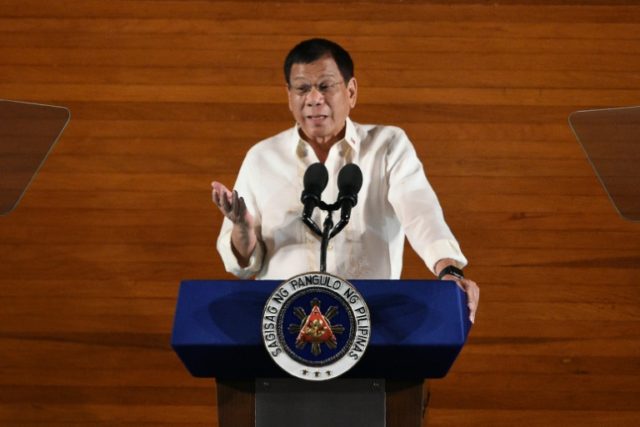Not taking the risk that Philippines president Rodrigo Duterte’s vows to kill all drug criminals are just empty promises, eighteen mayors and dozens of police officials have turned themselves in to police after Duterte read a list of 150 wanted names in a speech Sunday.
The Los Angeles Times puts the number of officials surrendering to police at eighteen mayors and 21 police officials so far. In the speech Sunday, Duterte said he had evidence that all 150 individuals named had ties to the drug trade, and he would give Philippine National Police (PNP) orders to lay siege to their homes and arrest or kill them if they did not hand themselves over peacefully to police. He also acknowledged that it was not a certainty these individuals were involved in the drug trade but that they needed to be investigated and their cooperation with police was pivotal to eradicate the nation’s growing drug problem.
The list includes seven judges, 95 police officers, and a number of mayors, congressmen, soldiers, and other public servants. Duterte ordered them all “hereby relieved” of duties, with 24 hours to surrender to police. Those still in office would no longer receive police security out in public. “Go out naked to the world and show how crooked you are,” Duterte dared them.
Before the most recent announcement, Duterte ordered the arrest of Albuera mayor Rolando Espinosa, whose son Kerwin is known to be one of the wealthiest drug traffickers in the country. Kerwin remains at large, but Rolando Espinosa is in custody after a dramatic gun battle left six police officers assigned to Espinosa’s security detail dead. Removing security from those accused would presumably save lives of officers ordered to protect public officials accused of drug crimes.
Since he delivered the speech Sunday, many of his opponents have sounded the alarm that such a move is a violation of the due process rights of those accused, who Duterte admitted had not been convicted. He appeared to have expected this criticism when he told the audience Sunday, “There is no due process in my mouth.”
Other criticism of his list has been technical: it includes a number of individuals who have been dead for years. The presidential office addressed the criticism that the list was not up-to-date Wednesday. “The president never said that they are alive. He just announced the names that according to intelligence reports were involved one time or another. So there is no error,” a spokesman argued.
“By calling out the names of the judges on the list, he is giving them every chance and opportunity to be prepared to defend themselves, clear their names if they are innocent, and alert the community of their involvement in drugs if they are guilty,” Presidential Communications Secretary Martin Andanar added.
Duterte himself has argued that reading the list is necessary due to the high number of individuals in the country involved in the drug trade. According to Duterte, 600,000 Philippine nationals are trafficking drugs, and millions addicted. “Do you know how long it would take to secure those warrants?” he asked. “It would take forever.”
The Los Angeles Times cites human rights activists in the Philippines are remarking that Duterte’s approach to fighting crime is extremely popular — using violence to eradicate the nation’s drug crime was the cornerstone of the successful Duterte presidential campaign, as Duterte efficiently dealt with the issue during his 22-year tenure as mayor of Davao City.
“[Duterte] is probably the most popular president we’ve ever had,” an anonymous human rights worker told the newspaper. “I’ve been watching this issue [for years] and I’ve never seen this kind of support for something so horrible from a human rights perspective.”

COMMENTS
Please let us know if you're having issues with commenting.